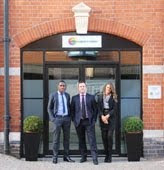After the Interview: Thank You Letters
The final step in the interviewing process is the thank you letter especially at a management recruitment level. Thank you letters are used to express appreciation and strengthen your candidacy. Don't underestimate how important they can be, as many candidates do not send them. A thank you letter is a great way to influence your interviewer after you have left the interview. If the employer is not sure about hiring you or someone else, a good thank you letter can help sway them in your direction. It can also solidify their decision by reaffirming they have made the right choice.
The thank you letter lets the employer know that you really want the position, which is important because employers believe a person will perform better if they really want the job. It also shows that you are courteous and professional, and gives you a chance to sell yourself once again and emphasize your good points.
Thank you letters should be sent immediately after your interview by mail, email, or fax. If mailed, they should be sent within 24 hours after your interview, or ideally on the same day if possible. Some Management Recruitment consultants will send them for you, that way it benefits both parties and won’t break the direct contact rules. They should be sent to each person that interviewed you, or at least the primary interviewers.
If the role you are being recruited for is being run as an Executive Search / Head Hunted campaign or a management recruitment assessment centre extra consideration regarding the timing and circumstances should be practiced. It’s a good idea to keep your management recruitment consultant in the loop.
All thank you letters should be written in a way to reaffirm your interest in the position. Thank you letters can be either formal or informal. Email and Fax are the quickest ways to get thank you letters to your interviewers. These means of sending the letter is acceptable in these high tech times, but often adding a personal touch by sending a handwritten note can go a long way. Informal hand-written notes help create a personal connection with the interviewer. Formal letters that are typed do not have the same impact as the personal handwritten letters, but they can allow you to "sell yourself" even more by summarizing why you are right for the job, and list any additional qualification you may not have cited during the interview.
Informal thank you notes should be handwritten on appropriate stationary and sent via mail. This could be a simple note card with the words "Thank You" on the front, or a nice piece of plain stationary. Keep in mind that the paper should still be professional. When writing the letter, use good handwriting. If your cursive writing is not legible, then printing is fine.
Formal thank you notes should be typed in a professional style and can be mailed, faxed, or emailed. These letters are typically a little longer, and you can reiterate why you are perfect for the job.
No matter which type of thank you letter you choose, you should always continue to follow professional business standards. Do not use shorthand or emoticons. Do remember to follow grammatical rules, use proper spelling, and formal your letter appropriately. At the end of your interview, make sure that you have the interviewer's contact information by verifying it with them or asking for a business card.
Wednesday, 16 December 2009
Subscribe to:
Post Comments (Atom)

1 comments:
Hi
Tks very much for post:
I like it and hope that you continue posting.
Let me show other source that may be good for community.
Source: Performance feedback phrases
Best rgs
David
Post a Comment